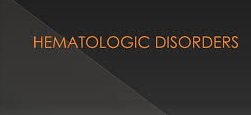Hematologic Disorders Multiple Choice Questions
1. For which disorder would appropriate nursing interventions include: no TM injections, no aspirin; and avoiding situations where injury might occur?
- Multiple myeloma
- Deep vein thrombosis (DVT)
- Polycythemia vera
- Leukemia
- Hemophilia
2. Treatment for sickle cell anemia is aimed at maintaining blood flow to the smaller vessels and diminishing the amount of excess blood cells being made by the bone marrow
- True
- False
3. In which hematologic disorders are patients susceptible to infection and often have significant pain from bone involvement of the disease?
- Multiple myeloma
- Leukemia
- Deep vein thrombosis (DVT)
- Polycythemia vera
- Hemophilia
4. What term means any type of inject able medication?
- Myeloid
- Mean corpuscular volume (MCV)
- Parenteral
- Mean corpuscular hemoglobin (MCH)
- Parietal cells
5. What measures the amount of oxygen-carrying hemoglobin inside red blood cells?
- Myeloid
- Mean corpuscular volume (MCV)
- Parenteral
- Mean corpuscular hemoglobin (MCH)
- Parietal cells
6. While patients are on immunosuppressive therapy post-bone marrow transplant, it is important to teach the patient to:
a. Avoid other people with signs of infection
b. Report signs of infection such as a sore throat or fever
c. Take the medications as directed
d. All of these
7. What term means the “formation of red blood cells?”
DDAVP
Demyelization
Bilirubin
Erythropoiesis
Ataxia
8. Which of the following is a test that determines vitamin B12 deficiency?
Shilling test
Reagent
Romberg test
Reticulocytes
Petechiae
Proprioception
9. Which type of anemia has the following signs and symptoms: diminished vibratory and CORRECT 10 position sense; poor balance due to effect on cerebral function; premature graying of hair and dementia appearing later in the disease?
Aplastic anemia
Sickle cell anemia
Pernicious anemia
Anemia
Iron deficiency anemia
10. What measures the average size of red blood cells?
Mean corpuscular volume (MCV)
Mean corpuscular hemoglobin (MCH)
Pariental cells
Parietal cells
Myeloid

11. What is a substance, part of bile, which is formed when red blood cells are broken down?
Erythropoiesis
DDAVP
Demyelization
Ataxia
Bilirubin
12. What is an autosomal recessive disorder in which an abnormal gene causes damage to the RBC membrane?
Aplitic anemia
Sickle cell anemia
Anemia
Iron deficiency anemia
Pernicious anemia
13. What term means “relating to bone marrow?”
Mean corpuscular hemoglobin (MCH)
Myeloid
Parietal cells
Mean corpuscular volume (MCV)
Parenteral
14. What are stomach cells that produce hydrochloric acid called?
Mean corpuscular hemoglobin (MCH)
Myeloid
Parenteral
Parietal cells
Mean corpuscular volume (MCV)
15. Oral supplementation of vitamin B12 is an effective treatment for pernicious anemia.
True
False
16. Which hematologic disorder will have the following test results: decreased hemoglobin; positive Schilling test; decreased amount of hydrochloric acid in the stomach; positive Romberg test and diminished sensation when testing for vibration, position sense and pro prioception of extremities?
Aplastic anemia
Pernicious anemia
Iron deficiency anemia
Anemia
Sickle cell anemia
17. Which hematologic disorder has the following signs and symptoms: infections due to low white blood cell production; bruising (ecchymosis) and tiny subcutaneous hemorrhages (petechiae); and bleeding from mucous membranes (GI tract, mouth, nose, vagina)?
Iron deficiency anemia
Aplastic anemia
Anemia
Sickle cell anemia
Pernicious anemia
18. For which hematologic disorder would appropriate nursing interventions include: protecting the patient from falls; avoiding IM injections due to altered clotting ability reducing the risks of cuts and bleeding?
Sickle cell anemia
Aplastic anemia
Anemia
Iron deficiency anemia
Pernicious anemia
19. Which hematologic disorder is typically treated by administration of oral iron supplements?
Pernidous anemia
Sickle cell anemia
Anemia
Aplastic anemia
Iron deficiency anemia
20. What disorder may be due to blood loss; damage to the red blood cells due to altered hemoglobin or destruction (hemolysis); nutritional deficiency (iron, vitamin B12, folic acid); lack of RBC production; or bone marrow failure?
Sickle cell anemia
Pernicious anemia
Iron deficiency anemia
Anemia
Aplitic anemia
21. Patients with pernicious anemia are treated with:
Oral folic acid
Oral iron
Parenteral vitamin B12
Oral prednisone
22. What is an X-linked recessive disorder, passed on so that it presents symptoms in males, and rarely in females?
Deep vein thrombosis (DVT)
Multiple myeloma
Leukemia
Polycythemia vera
Hemophilia
23. What is the term meaning “subconscious awareness of position, posture, movement, and changes in equilibrium?”
Proprioception
Reagent
Reticulocytes
Romberg test
Petechiae
Shilling test
24. Which hematologic disorder occurs when a person is missing a coagulation factor that is essential for normal blood clotting?
Leukemia
Polycythemia Vera
Multiple myeloma
Hemophilia
Deep vein thrombosis (DVT)
25. What hematologic disorder is a malignancy of the plasma cells causing an excessive amount of plasma cells in the bone marrow?
Leukemia
Hemophilia
Polycythemia Vera
Deep vein thrombosis (DVT)
Multiple myeloma